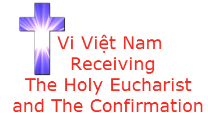The Confirmation
The sacrament of confirmation is the 4th of the 7 Sacraments,
- Baptism
- Penance/Reconciliation
- Eucharist
- Confirmation
- Matrimony
- Holy Orders
- Extremunction or Anointing
of the Sick
The sacrament of confirmation completes the sacrament of baptism. If baptism is the sacrament of re-birth to a new and supernatural life, confir- mation is the sacrament of maturity and coming of age. The real confession of Christ consist in this ‘that the whole man submits himself to Truth, in the judgment of his understanding, in the submission of his will and in the consecration of his whole power of love . . . To do this, poor-spirited man is only able when he has been confirmed by God’s grace’.
This confirmation in the power of the Holy Spirit leading to a firm profession of faith has always been the particular effect which Catholic tradition has ascribed to the sacrament. It is effect which complements and completes that of baptism.
- it roots us more deeply in the divine filiation [as sons of God] which makes us cry, “Abba! Father!”;
- it unites us more firmly to Christ;
- it increases the gifts of the Holy Spirit in us;
- it renders our bond with the Church more perfect;
- it gives us a special strength of the Holy Spirit to spread and defend the faith by word and action as true witnesses of Christ, to confess the name of Christ boldly, and never to be ashamed of the Cross.
